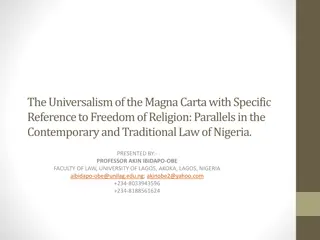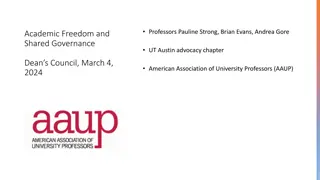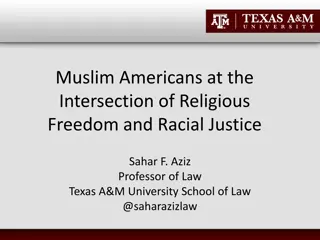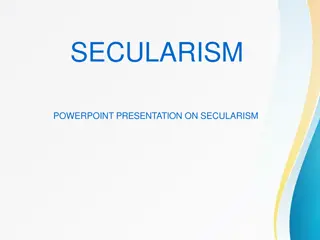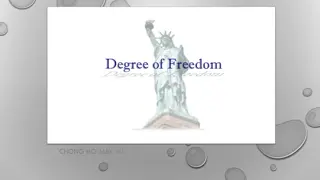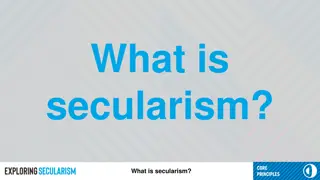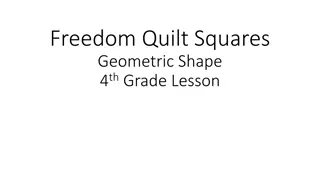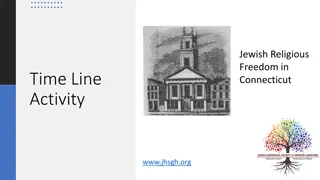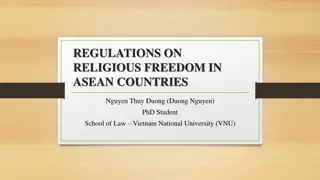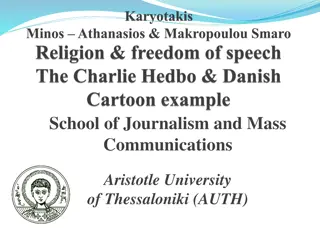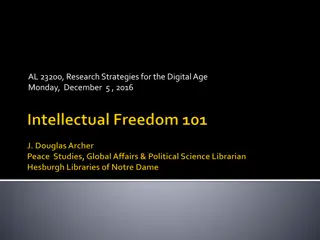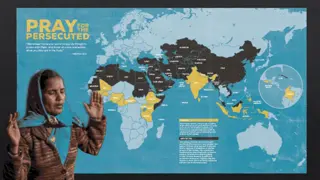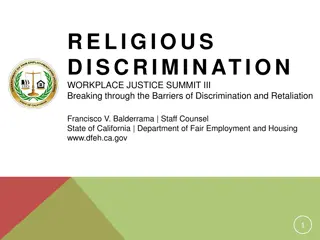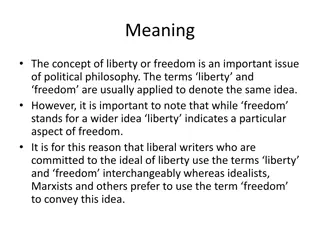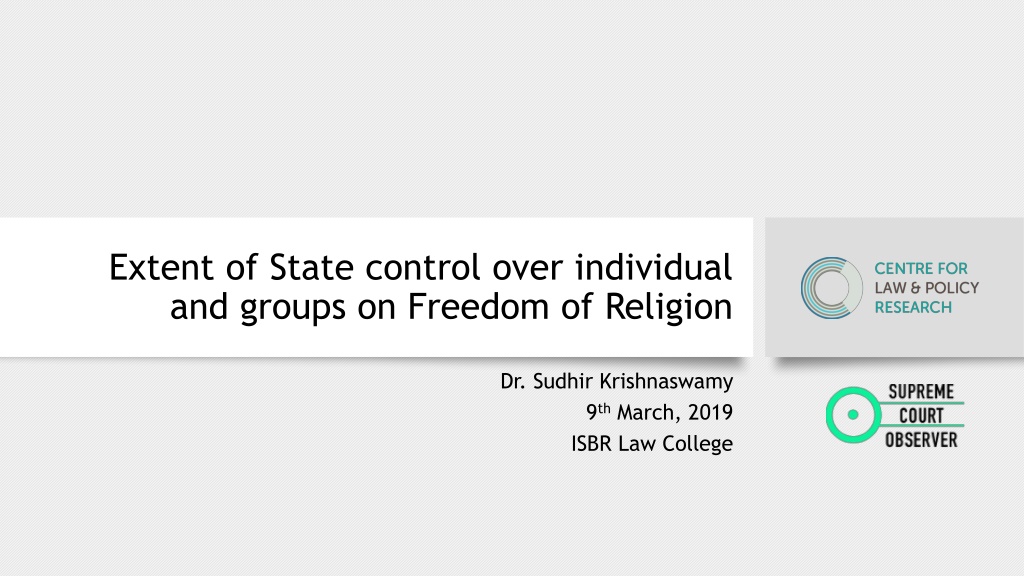
State Control and Freedom of Religion: Legal Perspectives in India
Explore the extent of state control over individuals and groups concerning freedom of religion in India, covering aspects of individual liberties, group rights, recent Supreme Court cases, and core challenges like the Triple Talaq case and Sabarimala Temple entry. Delve into the legal intricacies and outcomes of key cases like Shayara Bano v. Union of India and Indian Young Lawyers Association v. State of Kerala.
Download Presentation

Please find below an Image/Link to download the presentation.
The content on the website is provided AS IS for your information and personal use only. It may not be sold, licensed, or shared on other websites without obtaining consent from the author. Download presentation by click this link. If you encounter any issues during the download, it is possible that the publisher has removed the file from their server.
E N D
Presentation Transcript
Extent of State control over individual and groups on Freedom of Religion Dr. Sudhir Krishnaswamy 9thMarch, 2019 ISBR Law College
? Individuals? Preamble:? Liberty? of? Belief,? Faith? and? Worship? ? A? 25(1):? all? persons? equally? entitled? to? freedom? of? conscience? and? to? 3P? their? religion,? subject? to? other? provisions? and? public? order,? morality? and? health? ? A? 27:? No? person? shall? be? compelled? to? pay? taxes? ? A? 28(3):? No? person? required? to? take? part? in? religious? instruction? /? worship? in? State? recognized? educational? institution? State? Preamble:? Secular? Republic? ? A? 25(2):? may? regulate? or? restrict? activity? associated? with? religious? practice? ? A? 25(3):? Hindu? religious? reform? ? A? 28:? No? religious? instruction? in? State? funded? educational? institution? Liberty? Equality? A? 29(2):? No? citizen? shall? be? denied? admission? in? State? funded? educational? institution? on? religious? grounds? A? 15(1):? ND? on? grounds? of? religion? ? A? 15(2):? ND? on? religious? grounds? for? public? spaces? ? A? 16(2):? ND? on? religion? for? ? public? employment? ? Groups? A? 26:? every? religious? denomination? has? the? right? to:? Establish? and? maintain? institutions? Manage? its? religious? affairs? Own,? acquire? and? administer? property? ? A? 29:? section? of? the? citizens? of? India? with? distinct? language,? script? or? culture? has? the? right? to? conserve? it? ? A? 30:? All? minorities? whether? religious? or? linguistic? have? the? right? to? establish? and? administer? educational? institutions? ?
Recent Supreme Court Cases Decided Shayara Bano v. Union of India (Triple Talaq) Indian Young Lawyers Association v. State of Kerala (Sabarimala) Goolrokh Gupta v. Burjor Pardiwala (Parsi Excommunication) On-going M Siddiq v. Mahant Suresh Das (Ayodhya) Sunita Tiwari v. Union of India (Female Genital Circumcision)
Triple Talaq Case CORE CHALLENGE: Talaq e biddat is un-Islamic and unconstitutional. ISSUE: Is it an Essential Religious Practice (ERP) protected under Art. 25? OUTCOME: 3:2 majority invalidated the practice
Sabarimala Temple Entry CORE CHALLENGE: Excluding women in menstruation age cycle violates their rights to freedom of religion and equality ISSUES: 1. Does the custom constitute an ERP? 2. Do Ayyappans form a separate religious denomination under Art.26? 3. Are ERPs subject to the morality restriction under Arts.25&26? OUTCOME: 4:1 majority struck down custom
Female Circumcision Question, reference order to CB: Whether the Dawoodi Bohra practice forms an ERP? AM Singhvi, counsel for Dawoodi Bohras: sought Constitution Bench referral defended practice as ERP via continuous usage test female khatna traces back 1400 years
Ayodhya Dispute In 2018, the 3 judge bench in a split 2:1 verdict held that Ismail Faruqui 1994 does not require reconsideration by a larger 5 judge bench. Ismail Faruqui upheld that mosques are not an essential feature of Islam and allowed State to acquire land at Ayodhya Justice Nazeer s Dissent sought 5 judge Bench reference Review Faruqui on essentiality of mosques Cites Shirur Mutt: essentiality must be determined with detailed examination of tenets, beliefs and practices of Islam (internal inquiry & not Court-based external inquiry)
Parsi Excommunication CORE CHALLENGE: Goolrokh Gupta approached the Court so that she may enter the Fire Temple and perform last rites. The Parsi Anjuman Trust had excommunicated her when she married a non- Parsi. ISSUE: Can a group s religious right to excommunicate (Article 26) subsume the individual right to practice religion (Article 25)? OUTCOME: The parties reached a settlement the Parsi Anjuman Trust allowed the petitioner to enter to perform last rites. The Constitution Bench never made any ruling on the issue.
Looking Ahead The Ayodhya dispute is first case where the ERP test will been applied in an inter-faith dispute. Is the ERP test even applicable in cases such as Ayodhya, where there is a competing claim to a resource, premised on so-called essential religious practices? Does the ERP test inherently preference scriptural, homogenous, long- standing religions? Are only rational religious practices protected by the Constitution? Do the Courts preference a monotheistic conception of religion? A strict interpretation of the 3-step test, when determining whether a group constitutes a religious denomination, appears to encourage the assimilation of smaller religions into large ones. Are group rights under the Constitution an end in itself or a means to better protect individual right?

